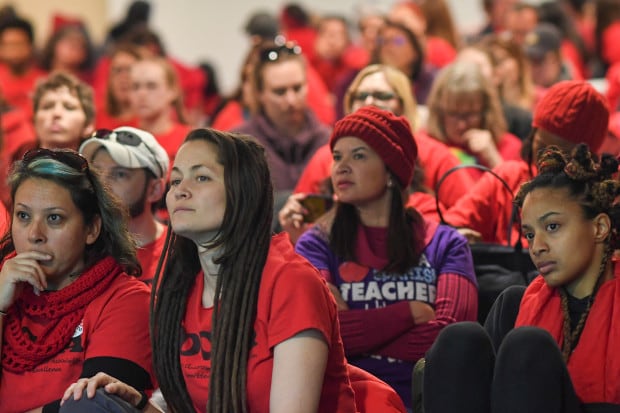Colorado teachers earn almost 36% less than other workers with college degrees, the widest such gap in the nation and a full 3 percentage points worse than the next closest state, Virginia.
That finding comes from the Economic Policy Institute, a union-backed progressive think tank, that for years has studied the teacher wage penalty, meaning the earnings that teachers forego by not going into another profession that requires similar training and education.
There’s no state where teachers earn more than other college-educated workers, but they come close in Rhode Island, New Jersey, and Wyoming, Colorado’s neighbor to the north.
But this doesn’t mean Colorado teachers are the lowest paid in the nation. Colorado teachers earn below the national average, according to annual data collected by the National Education Association, but they’re roughly in the middle of the pack.
In 2021, the average Colorado teacher earned a little more than $60,000, according to the Colorado Department of Education. But districts vary widely and starting pay can be quite low. The median Colorado teacher earned closer to $45,000 in 2021.
Colorado’s gap is a combination of low teacher wages, particularly starting pay, and more highly paid workers in other fields, said economist Sylvia Allegretto, the study author.
“There are two moving parts,” Allegretto said. “There is what is happening to the pay of other college graduates and what is happening to teacher pay.”
This gives Phyllis Resnick, an economist at the Colorado Futures Center at Colorado State University, some hesitation about turning Colorado’s most-underpaid status into a “bumper sticker.” Resnick wasn’t involved in the wage penalty study and reviewed it at Chalkbeat’s request. She described the methodology as “very sound and appropriate.”
But the margin of error on a complex statistical analysis means Colorado may be one of several states with very large gaps, rather than dead last. And the variation in the jobs mix in each state serves as a major driver of the gap.
Despite a wage penalty of only 4%, Wyoming teachers on average earn only $2,000 more per year than Colorado teachers do, and they’re both below the national average.
“Maybe in State One everyone with a bachelor’s degree is a bank teller and in State Two everyone with a bachelor’s degree is a nuclear physicist,” Resnick said. “I’m not saying teachers aren’t underpaid in Colorado. They very probably are. But that gap is driven by the other types of jobs we’ve got in Colorado.”
For Allegretto, that’s a strength of her approach. Fewer people are going into teacher preparation programs, with one reason being that young people see they can earn more in other professions. Comparing teachers with other workers in their state, who face similar cost of living, rather than with teachers in other states, gives a better sense of what people are giving up to go into education.
“It has everything to do with recruitment and retention,” she said.
Allegretto said expecting teachers to accept lower wages as part of the deal is a choice society makes. Policymakers could choose to spend more and pay teachers similar to lucrative professions.
Nationally, this gap has gotten worse over time and is the highest it’s ever been. The average teacher earns 23.5% less than other workers with similar education levels, and even accounting for more generous public sector benefits, total compensation for teachers is 14.2% less, the study found.
When adjusted for inflation, average teacher weekly earnings have increased just $29 since 1996, according to the Economic Policy Institute, while weekly wages for other college-educated workers have gone up $445 in the same time period.
The analysis, which controls for factors like race, gender, and age, draws on data from the past five years. Many Colorado school districts have raised pay significantly in the last two years, but Allegretto said that’s unlikely to change the gap in the short term.
“They would have to be very high increases, year over year, sustained for quite a while to make up these large gaps,” Allegretto said. “There’s no indication wages in other professions are falling off. You have to make up the difference to make it an attractive profession compared to other options.”
Resnick recently did an analysis for the Keystone Policy Center that compared Colorado teacher salaries and affordability of home ownership and found that owning a home was getting harder even as teacher salaries were rising.
Resnick noted the labor market for teachers doesn’t operate freely.
“Teachers are public sector employees, and there has been pressure for 40 years to cut public sector expenditures relative to private sector pay,” she said. “We had a 40-year tax revolt in this country and that has contributed to holding down teacher salaries.”
Bureau Chief Erica Meltzer covers education policy and politics and oversees Chalkbeat Colorado’s education coverage. Contact Erica at emeltzer@chalkbeat.org.






